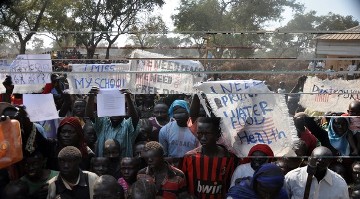Sudan softens stance on foreign aid groups for Blue Nile and S. Kordofan
January 22, 2012 (KHARTOUM) – The Sudanese government appears to have softened its stance regarding the presence of foreign aid groups in the border states of Blue Nile and South Kordofan where Khartoum is battling rebels belonging to the Sudan People’s Liberation Movement North (SPLM-N).

The United States has warned of an imminent famine by March if Khartoum does not allow United Nations (UN) agencies and aid groups in by then.
It was also reported that Washington is drafting plans for a unilateral intervention for the purpose of delivering aid to the needy in Blue Nile and South Kordofan.
But the Sudanese government warned against any such move saying that humanitarian assistance should be provided only in coordination with Khartoum.
The United Nations humanitarian chief Valery Amos visited Khartoum earlier this month to discuss the humanitarian situation in the two states and called on the government to allow UN and international aid workers to reach the rebel controlled areas.
Amos also warned that food insecurity and malnutrition have reached “alarming” levels in areas controlled by the SPLM-N.
She proposed that providing aid to the SPLM-N areas will be monitored by African and Arab figures.
Today the Sudanese foreign ministry and Humanitarian Aid Commission (HAC) held a meeting with representatives of twenty aid groups including those from the UN and other international organisations.
According to Sudan official news agency SUNA the government issued directives saying that all aid groups that were present before the fighting broke out in the two states will be able to continue working there under certain conditions.
With regards to aid distribution, Khartoum ordered that this can only be done through HAC and the Sudanese Red Crescent. Also any infrastructure projects are to be implemented by the relevant ministries and local organisations. This rule also applies to social development projects.
Representatives from the UN and other international organisations will be allowed to be present in the state capitals only after obtaining necessary permissions from the pertinent authorities who will determine the duration of the permit.
Today’s decision seems to be seeking a middle ground on international demands of allowing full access to aid agencies. But it remains to be seen whether local groups are capable of effectively carrying out the aid distribution.
The foreign ministry spokesman, Al-Obaid Marwih was quoted by SUNA today as saying that the government has been monitoring coordinated movement by “extremist groups” in the US to prepare the international arena for action in these two states.
Marwih said that the US is ignoring the real cause behind the trouble, is who violated agreements and decided to continue to carry arms, in clear reference to the SPLM-N. He added that Sudan doesn’t mind a ceasefire in order to allow for the delivery of aid.
The violence has already forced about 417,000 people to flee their homes, more than 80,000 of them to South Sudan, the United Nations estimates. Locals have faced air raids and sporadic ground fighting, according to human rights groups and refugees.
(ST)
